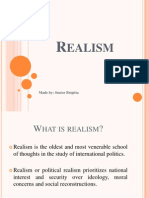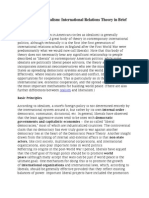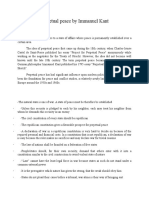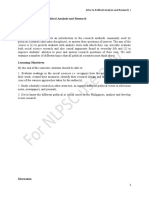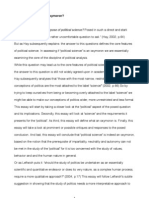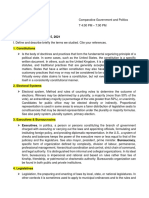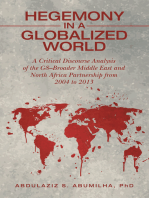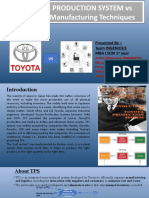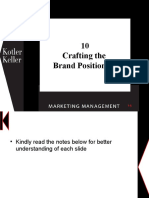International Political Economy
International Political Economy
Uploaded by
lkg3000Copyright:
Available Formats
International Political Economy
International Political Economy
Uploaded by
lkg3000Copyright
Available Formats
Share this document
Did you find this document useful?
Is this content inappropriate?
Copyright:
Available Formats
International Political Economy
International Political Economy
Uploaded by
lkg3000Copyright:
Available Formats
GWANGSEOK LEE PLSC 014 Professor Robert Packer International Political Economy
We live in a society where we can find massive amounts of Chinese or Mexican products at any markets in the United States; and those products are relatively cheaper than the prices of other products in the same category. Purchasing a product at lower price is one of our privileges that we, the customers, get by living in a global society where the international trade is promoted. On December 8, 1993, North America Free Trade Agreement (NAFTA) was signed into law and people hoped that this free trade agreement would create jobs and enhance the competitiveness of domestic businesses. After the United States, Mexico, and Canada were tied to this multilateral trade agreement, some economists regarded it as a net loss for American labor and the environment, but some business corporations regard it as a godsend opportunity (Burfisher: 2008). As we have noticed, there different views exist on a situation in International Economy. Accordingly, many scholars defined some major views in International Political Economy in order to understand the different interests in International Political Economy. In this passage, we will overview the general concepts of the major views, the policies those interest groups prefer, and the important factor that causes the changes in government policies.
Through the international trade, the states will not only exchange products, and capitals but they also create the economic interdependence among other states that highlight the necessity of political intervention in International Political Economy
(Gasiorowski: 1986). As I have mentioned earlier, there are three major perspectives in International Political Economy: Commercial Liberalism, neo-Mercantilism, and Structuralism; and the major factor, which defines the boundary among theses perspectives, is the view of the relationship between politics and economics. Liberals believes that individual and firms get mutual benefits through the market exchange; Liberals also emphasize growth and equity over equality in meaning of minimizing the intervention of governments in markets. Having firm belief in laissez-faire, Liberals favor minimal government intervention in the economy (Packer: 2011a). Moreover Liberals argue that the economic interdependence facilitates peaceful relationship between states, encourages the investment flow, and increases the opportunity of going to war (Ripsman: 1996). In a moderate way, Structuralists shares the similar view with Liberalists strictly only in government intervention; Structuralists argue that government should not intervene in the issues in general economics since the political power reflects the voice of ownerships. Structuralists perceive the society as a stage of struggling between the capitalist class and the working class; and they argue that the dominance of the capitalist class over the working class was created because of the high productivity in industries that led the capitalists to lower the wages of workers in order to meet the marginal profit (Krugman: 2007). Now, living in a global society, Structuralists are concerned about the status of labor power in a global economy; they claim that the labor power has weakened vis--vis transnational capital and corporations. Structuralists believe that the developing countries, viewed as the working class, will work for the developed countries, viewed as the capitalists, instead of experience the advances of new technologies and life quality. Therefore, Structuralists have deep distrusts in governments for reflecting the voice of
ownerships, such as, lowering the wages of workers. However, neo-Mercantilists believe the importance of governmental intervention. Neo-Mercantilists argue that politics may determine economics in order to promote the advance of domestic production and employment, ultimately the competitiveness of the domestic businesses in the global market. Neo-Mercantilists notes the importance of government in building of infrastructure, providing more efficient transportation facility, and assisting exporting firms; moreover, they allow governments to subsidize their businesses if those decisions are necessary to enhance the competitiveness (Packer: 2011b). Though these schools have different views in the relationship between politics and economy, they unanimously agree that an international trading is an essential part of the global society and they also admit that some producers will gain relatively more than others.
When someone gains more than others, the others will likely to find a way to survive and, in international economy, we named this action: Protectionism. The purpose of international trading is to lower the price of production so that the products can expect higher demand, if the quality is equivalent to other products, in markets based on the law of supply and demand (Jain: 2007). Thus, the producers, who have comparative advantages, will export their products eagerly to other countries; and the domestic producers, who dont have comparative advantages, will likely to lose their competitiveness in markets; and there are two explanations for the behaviors in protectionism and what interest groups are interested in protectionism. Based on Stolper-Samuleson theorem, Factor model argues that states produce and export goods that use intensively its relatively abundant factor and import
goods that use intensively its relatively scare factor. It claims that if country A is abundant in factor X and scarce in factor Y when country B is abundant in factor Y and scarce in factor X, they are likely to open a trade market. However, the producers of factor Y in country A will be harmed by the trade so they are likely to support protectionism in order to maintain their market shares. Therefore, Factor model argues that, in international trade politics, there will be a conflict between interest groups, which are owners of abundant factors and owners of scarce factors. Based on Ricardo-Viner model, Sector model argues that there will be a conflict between export-oriented industrial sectors and import-competing
industrial sectors. For example, in the United States, textile capital and labor could be protectionist, while computer capital and labor could be for trade; in general, the producers ask government for put higher tariffs on other countries goods so that the domestic products can have relative price advantages in markets (Packer: 201c); the solution of the tariff strategy for export-oriented producer is Free Trade Agreement.
While those interests groups struggle, I havent mentioned the most important factor that enabled all the possibilities in International trade: the capital mobility. The labor mobility is strictly limited since it does require physical migrations of labor forces; however since the capital mobility
required monetary transactions, such as, Foreign Direct Investment, Bilateral/Multilateral funds, which require less physical mobility than the labor mobility does (Spiegel). Based on this advantage of capital, states try to attract transnational corporations, and multinational corporations to invest capitals in their states. In order to attract investors, governments try to issue their bonds to foreign investors. Issuing bonds to foreign investors is a good idea to collecting capitals from other countries; however, this strategy may jeopardize a fiscal policy of a state and cause a heavy fluctuation in currency value when it depends excessively on foreign investments (Packer: 2011d). For example, in order to secure the bondholders, governments try to minimize the fluctuation of the interest rate; however, is a crisis, governments fail to pay their debts back to banks and the banks raise the interest rates which reflect the governments inabilities to pay their debts back; and, eventually, the bondholders are likely to feel insecure about their bonds and may try to sell those bonds back (Packer: 2011e). Though there are some risks to attract foreign investors, states still try to attract investors. Many governments try to free their taxes, lower the wages of workers, and build infrastructure for convenience; and some scholars look at this situation in different perspective. Liberals believe that the capital mobility will enhance the general life quality in developing countries through
creating jobs, benefiting side effects from infrastructures, and providing higher education. On the other hand, Structuralists believe that the capital mobility will benefit only developed countries while harm all the developing countries. Structuralists believe that the general life in developing countries will degrade because of the government policy that tries to lower the wages of workers, and the foreigners investing method that is borrowing money from domestic bank instead of bringing capitals from their countries. However, generally, the capital mobility is believed to enhance the general life quality of both developed and developing countries (Epstein). As we have seen in this passage, the capital mobility plays an important role in the behaviors of governments in making their policies. Certainly, there are numerous variables that are playing major roles in International Political Economy beside the abundance and scares factors, the orientations of different trading behaviors, and the advancement capital mobility. However, we have seen that those variables, which we discussed, have significant impacts on the government policies that make differences in the future. Living in the global society as consumers, we experience the privileges of purchasing goods with good quality at very good prices. However, being as members of the global society, it is
important to keep in minds to find a harmonic boundary where the equity and equality are reasonably balanced.
Word Count: 1476
Citations
Epstein, Gerald. Winners and Losers in the Global Economics Game. Date & Publisher Unknown. Class reading assignment.
Krugman, Paul. 2007. In Praise of Cheap Labor. 2007. The Dismal Science.
Spiegel, Steven L. World Politics: Ch.8 North-South Economic Relations:
The Challenge of Development. Harcourt Brace College Publishers
Robert Packer. 2011. Class Notes. 2011 The Pennsylvania State University
Malkin, Elisabeth. 2009. Did NAFTA Actually Help Mexico? December 10th,
2009. The New York Times
Burfisher, Mary E. 2008. The Journal of Economic Perspectives: The
Impact of NAFTA on the United States. Pg.127. 2008. American Economic
Association
Rpsman, Norrin M.1996. Commercial Liberalism under fire: Evidence from
1914 and 1936. 1996. Routledge: Taylor & Francis Group
Gasiorowski, Mark J. 1986. Economic Interdependence and International
Conflict: Some Cross National Ecidence: International Studies Quarterly. Vol.30. pg. 23-28. 1986. Blackwell Publishing
Jain, TR. 2007. Microeconomics and Basic Mathematics. 2006. New Delhi: V.K. Publications
You might also like
- Shubham Keswani May 22 Notes PDFDocument264 pagesShubham Keswani May 22 Notes PDFNick Vincik67% (15)
- Maersk Line: B2B Social MediaDocument4 pagesMaersk Line: B2B Social MediaGarvita100% (1)
- Pol 101 NotesDocument21 pagesPol 101 NoteskeemenaosetlhodiNo ratings yet
- Audit Committee EY-Staying-on-course-guide-for-audit-committeesDocument80 pagesAudit Committee EY-Staying-on-course-guide-for-audit-committeesVeena HingarhNo ratings yet
- Scribd - International Relations Realism NotesDocument12 pagesScribd - International Relations Realism NotesSean BurkeNo ratings yet
- San Miguel CorporationDocument30 pagesSan Miguel CorporationANTHONY DAWN CABUG100% (1)
- New International Political EconomyDocument8 pagesNew International Political Economybasantjain1987100% (1)
- RealismDocument14 pagesRealismBrigitta SzutorNo ratings yet
- Marxist-Leninist Theory of International RelationsDocument10 pagesMarxist-Leninist Theory of International RelationsEndry Abidin100% (2)
- Nature and ApproachesDocument16 pagesNature and ApproachesAyush ShivhareNo ratings yet
- 1 An Introduction To International RelationDocument12 pages1 An Introduction To International RelationShaksham ShahiNo ratings yet
- Idealism and RealismDocument47 pagesIdealism and RealismAmr SoussaNo ratings yet
- International Political Economy NotesDocument52 pagesInternational Political Economy NotesTal100% (6)
- Approaches of International RelationsDocument10 pagesApproaches of International RelationsHash SinghNo ratings yet
- LIBERAL THEORIES OF INTERNATIONAL RELATIONS: A PRIMER - Andrew MoravcsikDocument15 pagesLIBERAL THEORIES OF INTERNATIONAL RELATIONS: A PRIMER - Andrew MoravcsikHarryson Castro AponteNo ratings yet
- Lecture Notes On DemocracyDocument7 pagesLecture Notes On DemocracygutterbcNo ratings yet
- Perpetual Peace by Immanuel KantDocument2 pagesPerpetual Peace by Immanuel KantTheodor IacobNo ratings yet
- 2018 Johnson Heiss Liberal InstitutionalismDocument21 pages2018 Johnson Heiss Liberal InstitutionalismShafa SabillaNo ratings yet
- Foreign Policy AnalysisDocument5 pagesForeign Policy AnalysisPatricia Guerra100% (1)
- Constructivism PDFDocument24 pagesConstructivism PDFdsjekw kjekwjeNo ratings yet
- Ravenhill - 2008 - Political EconomyDocument26 pagesRavenhill - 2008 - Political EconomyBreno Fernandez0% (1)
- Introducing Liberalism in International Relations TheoryDocument4 pagesIntroducing Liberalism in International Relations TheoryCanaanNo ratings yet
- Introduction To Political ScienceDocument18 pagesIntroduction To Political Sciencecyrene cayananNo ratings yet
- IR TheoriesDocument16 pagesIR TheoriesEzKeezE100% (1)
- Foreign Policy Analysis 2Document8 pagesForeign Policy Analysis 2Arya Filoza PermadiNo ratings yet
- Liberalism Lecture PresentationDocument48 pagesLiberalism Lecture PresentationRahmatahir Rahma100% (2)
- Nigeria and South Africa Local Government SystemDocument20 pagesNigeria and South Africa Local Government SystemOlajideAbatanNo ratings yet
- Fundamentals of Political EconomyDocument208 pagesFundamentals of Political Economypsyops008No ratings yet
- Governmental PoliticsDocument15 pagesGovernmental PoliticsCleon Magayanes100% (1)
- Nation State System State and Non State Actors Lecture 3Document2 pagesNation State System State and Non State Actors Lecture 3muhammad junaidNo ratings yet
- Intro Political Analysis and ReseachDocument56 pagesIntro Political Analysis and ReseachDhanaNo ratings yet
- Essential of International RelationsDocument65 pagesEssential of International RelationsMukhtiar AliNo ratings yet
- Introduction To Political Science NotesDocument3 pagesIntroduction To Political Science NotesGerard TinampayNo ratings yet
- Theory and Methods in Political ScienceDocument8 pagesTheory and Methods in Political Scienceapi-2602196267% (3)
- Tradition: ThemesDocument11 pagesTradition: ThemesSheryl C. BalmesNo ratings yet
- CGP - Define and Describe Briefly The Terms We Studied - Momo - 2CED-4aDocument4 pagesCGP - Define and Describe Briefly The Terms We Studied - Momo - 2CED-4aJomillen Cautiverio MomoNo ratings yet
- Political Science NotesDocument104 pagesPolitical Science NotesIram K KhanNo ratings yet
- AIR742 Week 6 ConstructivismDocument25 pagesAIR742 Week 6 ConstructivismHaiderrehmanNo ratings yet
- Ancient and Medieval Political ThoughtDocument63 pagesAncient and Medieval Political Thought767hyrr4zcNo ratings yet
- Model of PoliticsDocument26 pagesModel of PoliticsViera RachmawatiNo ratings yet
- Global Political Economy - (IRL 3209) Lect 2Document24 pagesGlobal Political Economy - (IRL 3209) Lect 2Sean100% (1)
- How U.S. Foreign Policy Is MadeDocument6 pagesHow U.S. Foreign Policy Is MadeForeign Policy Association100% (2)
- Machiavelli Realism Idealism Vs PragmatismDocument39 pagesMachiavelli Realism Idealism Vs PragmatismOswaldo León100% (2)
- Econ 434 International Political EconomyDocument10 pagesEcon 434 International Political EconomyErsin TukenmezNo ratings yet
- Introduction To International RelationsDocument39 pagesIntroduction To International RelationsShanuki PasangnaNo ratings yet
- Balance of Threat Theory and U.S. Perception of "Iran Nuclear Threat"Document10 pagesBalance of Threat Theory and U.S. Perception of "Iran Nuclear Threat"Shahidul IslamNo ratings yet
- 1-2 What Is PoliticsDocument17 pages1-2 What Is PoliticsMostafa MohamedNo ratings yet
- International Political EconomyDocument2 pagesInternational Political EconomyChristopher SmithNo ratings yet
- National Security Perceptions of The PhilippinesDocument4 pagesNational Security Perceptions of The PhilippinesjealousmistressNo ratings yet
- U.S. Foreign PolicyDocument19 pagesU.S. Foreign Policyprateekyadav1608No ratings yet
- Introduction To International Relations Course SyllabusDocument6 pagesIntroduction To International Relations Course Syllabusdov_waxmanNo ratings yet
- Types of Government: For A Few Countries More Than One Definition AppliesDocument3 pagesTypes of Government: For A Few Countries More Than One Definition AppliesSimona OlteanuNo ratings yet
- Oligarchic Patrimonialism Bossism Electoral Clientelism and Contested Democracy PDFDocument23 pagesOligarchic Patrimonialism Bossism Electoral Clientelism and Contested Democracy PDFClifford De Jesus100% (1)
- Political ScienceDocument20 pagesPolitical ScienceMary Ann Tan100% (1)
- Introduction To PoliticsDocument39 pagesIntroduction To PoliticsBikbik MontañaNo ratings yet
- Political CultureDocument2 pagesPolitical CultureChasNo ratings yet
- Liberalism: International Relationship TheoryDocument23 pagesLiberalism: International Relationship TheoryDanny Kunto WibisonoNo ratings yet
- Notes On The Historical Evolution of International PoliticsDocument10 pagesNotes On The Historical Evolution of International PoliticsDanielNo ratings yet
- Levels of Analysis in International RelationsDocument4 pagesLevels of Analysis in International RelationsTomáš KoziakNo ratings yet
- International Political Economy Exam PaperDocument13 pagesInternational Political Economy Exam PaperNenad KrstevskiNo ratings yet
- Southeast Asia What S in A Name by Donald K EmmersonDocument22 pagesSoutheast Asia What S in A Name by Donald K EmmersonFrançoisDeLaBellevieNo ratings yet
- Hegemony in a Globalized World: A Critical Discourse Analysis of the G8–Broader Middle East and North Africa Partnership from 2004 to 2013From EverandHegemony in a Globalized World: A Critical Discourse Analysis of the G8–Broader Middle East and North Africa Partnership from 2004 to 2013No ratings yet
- 3 SettleDocument35 pages3 SettleBhanu Satya SaiNo ratings yet
- @C - c4hmc92 Exam Dumps PDF 2020Document3 pages@C - c4hmc92 Exam Dumps PDF 2020TonyNo ratings yet
- Com SyllabusDocument32 pagesCom Syllabusbalup944No ratings yet
- Trouble in The Making The Future of ManufacturingDocument29 pagesTrouble in The Making The Future of ManufacturingKim Premier MLNo ratings yet
- XENI Marketing PresentationDocument13 pagesXENI Marketing PresentationCapt. MohammedNo ratings yet
- May 2017 Monthly Disbursement ReportDocument186 pagesMay 2017 Monthly Disbursement ReportPl PlNo ratings yet
- SME Programme Lending: Overview Group Best Practices & Key ChallengesDocument29 pagesSME Programme Lending: Overview Group Best Practices & Key ChallengesSaif IqbalNo ratings yet
- Taste The FeelingDocument2 pagesTaste The FeelingSaagar HiRaNo ratings yet
- Consideration of Internal ControlDocument6 pagesConsideration of Internal Controlinto the unknownNo ratings yet
- ERP Link: Erp - Aktu.ac - in (MANDATORY)Document3 pagesERP Link: Erp - Aktu.ac - in (MANDATORY)Naman MishraNo ratings yet
- Customs Circular No. 25/2015 Dated 15th October, 2015Document10 pagesCustoms Circular No. 25/2015 Dated 15th October, 2015stephin k jNo ratings yet
- Internal Audit and Risk ManagementDocument68 pagesInternal Audit and Risk ManagementMayur R NeelavarNo ratings yet
- Group7 - TPS Vs Modern Manufacturing TechniquesDocument22 pagesGroup7 - TPS Vs Modern Manufacturing TechniquesDat BoiNo ratings yet
- Controlling Management Programs: D4 1B Managerial Accounting Group MembersDocument20 pagesControlling Management Programs: D4 1B Managerial Accounting Group MembersgusnaandreNo ratings yet
- 1 Year: Major Map: BBA Degrees Offered by The Dept. of ManagementDocument5 pages1 Year: Major Map: BBA Degrees Offered by The Dept. of ManagementFahad FerozNo ratings yet
- BM Midterm Chapter 7Document10 pagesBM Midterm Chapter 7James Montes100% (1)
- Service EncounterDocument19 pagesService EncounterAkshey Gaur100% (2)
- Islamic Banking and Finance Review (Vol. 7), 451-Article Text-3433-1-10-20210329Document24 pagesIslamic Banking and Finance Review (Vol. 7), 451-Article Text-3433-1-10-20210329UMT JournalsNo ratings yet
- MGT 212 - Fall 2021 - Group CaseDocument12 pagesMGT 212 - Fall 2021 - Group CaseJaved UddinNo ratings yet
- Migrating To BW On HANA - Real Life Lessons - A..Document10 pagesMigrating To BW On HANA - Real Life Lessons - A..Ranjith ReddyNo ratings yet
- Advanced Financial Accounting and Reporting III Final Exam Answer KeyDocument16 pagesAdvanced Financial Accounting and Reporting III Final Exam Answer KeyCarlito B. Bancil100% (1)
- LeadGen Freelance ProjectDocument17 pagesLeadGen Freelance ProjectK JayNo ratings yet
- QSP 17.material Handling, PreservationDocument2 pagesQSP 17.material Handling, Preservationkmvimal36No ratings yet
- Mergers and Acquisitions Notes at Mba Bec Doms of FinanceDocument15 pagesMergers and Acquisitions Notes at Mba Bec Doms of FinanceBabasab Patil (Karrisatte)100% (1)
- Brand PositioningDocument23 pagesBrand PositioningRohit ChourasiaNo ratings yet
- Sarah Holloway: 4618 Valley Overlook Dr. Apt. 102, Midlothian, VA 23112 804-396-0985Document3 pagesSarah Holloway: 4618 Valley Overlook Dr. Apt. 102, Midlothian, VA 23112 804-396-0985sothe1No ratings yet







